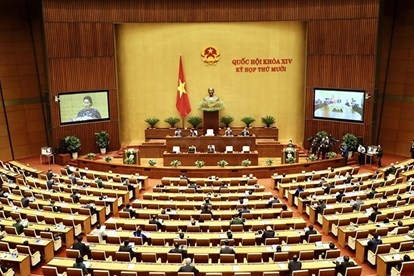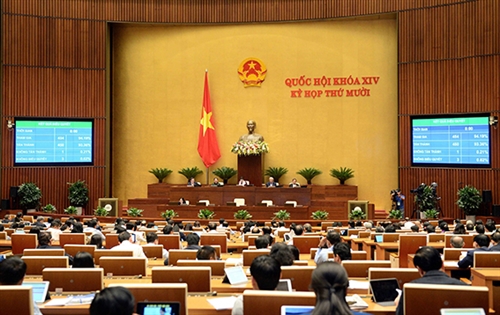The Law on Investment and Law on Enterprises have a number of articles revised under the Law amending nine laws (the Law), which was passed on January 11 this year at the first extraordinary session of the 15th National Assembly.
Coming into force on March 1, the Law aims to institutionalize the Party’s guidelines and the State’s policies on law building and remove obstacles to production, business and social activities, especially in the context of COVID-19 prevention and control, and socio-economic recovery and development.
Outstanding amendments to the Law on Investment
The provision of cyber security products and services, excluding provision of cyberinformation security products and services and provision of civil cryptography products and services, is stipulated as a new conditional business line in the Law. This conditional business line is numbered 132a on the List of sectors and trades subject to conditional business investment provided in Appendix IV to the Law on Investment.
The Law supplements the regulation on the competence of the Prime Minister and provincial-level People’s Committees to approve investment policy for investment projects. Accordingly, the Prime Minister may approve investment policy for investment projects to build houses (for sale, lease or lease-purchase) or urban centers using 300 hectares of land or more, or accommodating 50,000 people or more, while provincial-level People’s Committees are competent to approve investment policy for those using under 300 hectares of land and accommodating under 50,000 people.
Previously, the determination of the competence to approve investment policy for these projects was more complex with the criteria for determination including not only land use scale and population scale, but also the criterion on the place (urban or non-urban area) where a project is located.
The competence to approve investment policy for projects within the protected areas of relics now belongs to the Prime Minister, for projects to be implemented in level-I protected areas of national relics or special national relics; or in level-II protected areas of special national relics on the List of world heritages, or to provincial-level People’s Committees, for projects to be implemented in level-II protected areas of national relics or special national relics, except special national relics on the List of world heritages; or in areas restricted from development or inner areas of special-grade historical urban centers. Notably, the Law states that implementation of the above projects must comply with the law on cultural heritage.
Amendments to the Law on Enterprises
Under the Law, the minutes of a meeting of the Members’ Council is no longer required to contain signatures of the attending members who disapprove the minutes.
Specifically, in case the chairperson and minutes taker of a meeting refuse to sign the meeting minutes, such minutes may become valid if it is signed by all other members of the Members’ Council who attend the meeting and agree to approve it. In this case, those who refuse to sign such minutes must bear personal liability for any damage caused to the enterprise due to their refusal in accordance with the Enterprise Law, the company charter and relevant laws.
According to the amendments to Article 148, the voting rate for a resolution of the General Meeting of Shareholders will be determined based on the number of votes of the shareholders who attend the meeting and cast their votes. Under previous regulations, this rate was determined on the basis of the number of votes of all attending shareholders, regardless of whether they cast their votes or not.
The Law says that except the cases specified in Clauses 3, 4 and 6 of Article 148, a resolution of the General Meeting of Shareholders on the following contents will be adopted when it is voted for by shareholders representing 65 percent or more of total votes of all shareholders who attend the meeting and cast their votes: (i) types of shares and total number of shares of each type; (ii) change in business sectors, trades or fields; (iii) change in the organizational structure of the company; (iv) investment projects or sale of assets with a value accounting for 35 percent or more of the total value of assets recorded in the latest financial statement of the company, unless another percentage or value is specified in the company charter; (v) reorganization or dissolution of the company; and (vi) other issues specified by the company charter.
Other resolutions will be adopted when they are voted for by shareholders representing more than 50 percent of total votes of all shareholders who attend the meeting and cast their votes, except the cases specified in Clauses 1, 3, 4 and 6 of Article 148.-









